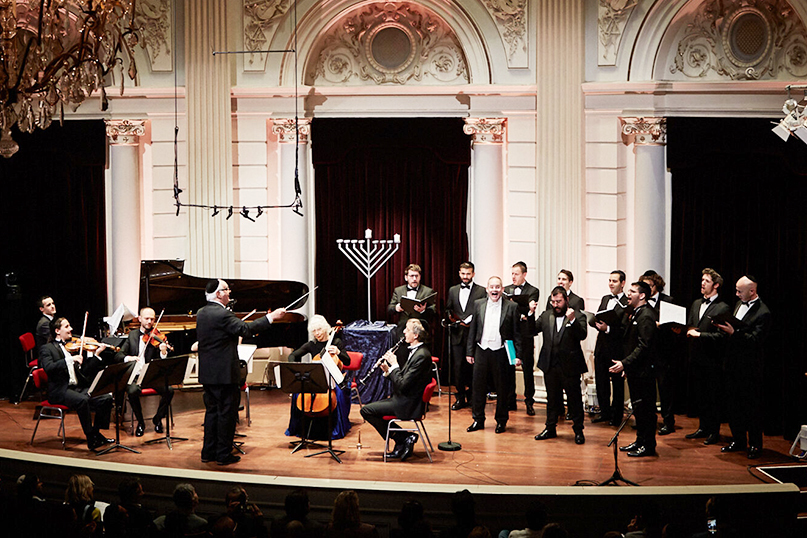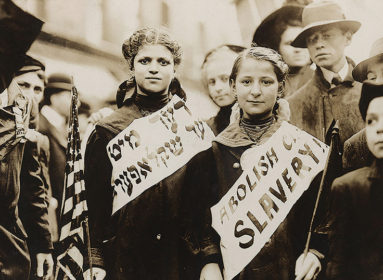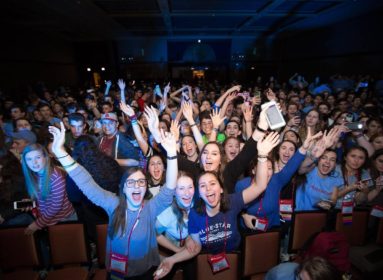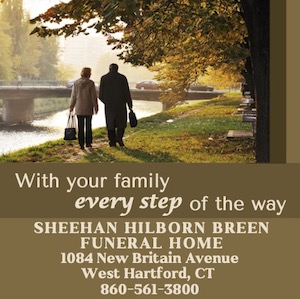
By Cnaan Liphshiz
AMSTERDAM (JTA) — There’s a huge pipe organ where the Torah ark should be, but otherwise this city’s Royal Concert Hall looks, sounds and feels like a synagogue for one night each year.
That’s because since 2015, this 132-year-old establishment, one of the world’s most prestigious music venues, has hosted an annual cantorial Chanukah concert.
A tradition that had been paused for 70 years after the Holocaust, its resumption is helping to unite and revitalize a dwindling and divided community with its glorious past.
The program ranges from traditional numbers like “Maoz Tzur,” a 13th-century poem, to “Al Kol Eleh,” an Israeli hit from 1980. The predominantly Jewish audience sings and claps along — a major faux pas at almost any other concert here — as those unaccustomed to singing in Hebrew struggle to pronounce the words correctly in an evident attempt to connect with their roots.
“Putting Holocaust commemorations aside, it’s one of the few moments when you have people from all Jewish denominations, from the most liberal to the most Orthodox, in one place for a Jewish event,” said Rabbi Yanki Jacobs, director of the Amsterdam chapter of the Hasidic Chabad-Lubavitch movement.
Besides the organ, the only other obvious giveaway that the dual-leveled venue is not a synagogue is the presence of prominent plaques affixed on the galleries bearing the names of famous composers — including one for the notoriously antisemitic Richard Wagner.
The event’s highlight is a religious element in which Chanukah candles are lit on a menorah that is an important symbol for this community: a 122-year-old silver artifact that was hid from the Nazis and is an exact replica of the priciest Chanukah menorah in the world, Amsterdam’s 267-year-old Rintel Menorah.
The concert was a tradition before World War II, when the Nazis put an end to it and went on to murder at least 75% of Dutch Jewry in the Holocaust. Since then, the Dutch Jewish community has failed to replenish its pre-Holocaust numbers — there are slightly fewer Jews living in the Netherlands today as there were in 1946, according to a demographics study from this year.
Leaders of the community of about 30,000 have raised questions in recent years about its future viability amid rising antisemitism and a culture of assimilation. About half of Dutch-Jewish parents don’t circumcise their children, for example, according to a survey from 2009. Less than 25% are members of a synagogue, and most Jews marry non-Jews.
With that mind Barry Mehler, the expatriate New Yorker who led the return of the Royal Concert Hall Chanukah concert, said he designed the event to fit the broadest range of Jews possible.
Mehler, 55, who came to Amsterdam in 1989 because it was “mecca for gay people,” as he puts it, hosts the concert with a mix of humor and musical virtuosity that transcends the growing polarization here among the religious denominations.
At the 2017 event, he asked the audience to note the shtreimel — a large hat made of sable fur common in certain haredi Orthodox communities — on the head of the cantor who was singing on stage.
“Isn’t that the most beautiful beehive hairdo you’ve ever seen?” he asked, producing roars of laughter from the crowd. Part of the joke was that the singer, the noted Orthodox Israeli cantor Israel Nachman, didn’t speak Dutch.
Buoyed by the Chanukah concert’s success Mehler, a Juilliard graduate who has worked with European synagogue choirs for decades, has created spinoffs with the Jewish Amsterdam Chamber Ensemble, including Israeli Independence Day events.
The Chanukah event has boosted communal spirit for a dwindling and ideologically divided community. (In 2015, the community fired the former chief rabbi of Amsterdam, Aryeh Ralbag, for supporting a declaration on homosexuality that recommended rabbis “guide same-sex strugglers towards a path of healing and overcoming their inclinations.”)
Mehler said he was motivated by these and other challenges to relaunch the Chanukah concert.
“I want to prove that through positive culture, you can revitalize a dying community in a way nobody imagined possible,” he said.
Since Mehler convinced the management of the Concertgebouw, the venue’s Dutch-language name, to restart the tradition in 2015, he has created programs performed by respected musicians — including a professional chamber ensemble, a cantorial choir and Nachman, who is known for his signature 20-second high note. The venue, favored by renowned conductors including Gustav Mahler and Leonard Bernstein, has unique acoustics and floor space of 13,000 square feet.
Mehler was never concerned about selling enough tickets: He assumed the event would be sold out. But getting Dutch Jews to buy the most tickets was a challenge he worried about and worked to meet by leaning into his advertising skills and many contacts in the Jewish community.
“I mean, it’s the Concertgebouw, people are going to come,” he said. “I didn’t want some concert ‘about Chanukah’: I wanted 2,000 people singing ‘Maoz Tzur’ together with outstanding Jewish musicians, like one could only experience in a place like New York.”
Mehler, who works in tech, took over the choir of Amsterdam’s Orthodox Rav Aaron Schuster Synagogue in the 1990s and also worked at the city’s Reform Jewish Congregation. He was the driving force behind the rebirth in 2003 of the famed Portuguese Synagogue’s Santo Serviço choir.
This year, the Chanukah concert will be livestreamed on Dec. 13 but will not take place physically because of social distancing measures connected to the COVID-19 pandemic. But Mehler and his team are already preparing a live concert set for Dec. 5, 2021, for which they are also raising funds to mitigate losses from this year’s cancellation.
The symbolism, the venue and the religious aspect of the concert add to its stature, but they also risk making the event pompous and stuffy, Mehler conceded. He makes sure that doesn’t happen, interjecting with jokes and comments. At the 2018 show, for example, a male soprano performed while wearing a diamond tiara and pink socks, and Mehler questioned the fashion choice onstage.
“The music is very professional and serious, but everything that happens in between is a huge joke,” Mehler said.
The return of the concert tradition was “a breath of fresh air,” said Mariette Groenenboom, a 60-year-old teacher who is a member of an Orthodox Jewish community in Amsterdam.
At the Chanukah concerts, ”there’s a real sense of community, like everyone is there, which is something that’s sorely missing for Dutch Jewry,” she said. “And not unimportantly, there’s also humor, chiefly from Barry’s narration, but also from the other musicians.”
Mehler is openly gay, but he said that hasn’t caused tension in his work at Orthodox synagogues. Orthodox rabbis who attend the concerts seem to agree.
“Personally, I accept any Jew regardless of how closely they follow halacha,” or Orthodox Jewish law, said Dovi Pinkovitch, a Chabad-Lubavitch rabbi who runs a synagogue in central Amsterdam. “Gay jokes and all that are not exactly my favorite genre, but it’s not very prominent at the concert. Frankly I just don’t get into the whole issue.”
To Pinkovitch, “it’s more interesting to see how people who don’t regularly come to synagogue do come to the concert, read the lyrics from the program and make an effort to connect to Judaism.”
Not everyone is charmed with Mehler’s style.
David Simon, a longtime activist for multiple Jewish causes who previously collaborated with Mehler on the concerts, parted ways with Mehler last year. He set up a different Chanukah concert that is taking place this year at a local synagogue.
“Barry’s devoted and has done plenty for the cultural scene here, but sometimes he’s just over the top and the events he puts on end up looking a bit too much like the Barry Mehler Show,” Simon told the Jewish Telegraphic Agency.
Still, for many Jews outside Amsterdam, the Chanukah concerts are the only annual Jewish event for which they will travel to the capital, said Ronald Nyhout, a 69-year-old member of the Jewish Community of Leiden, a city located about 40 miles south of Amsterdam.
“We have Jewish life here,” he said, “but the concerts are just unique.”
Main Photo: Cantors and musicians perform at the annual CChanukah event at the Royal Concert Hall in Amsterdam, Dec. 22, 2019. (Credit: Eduardus Lee)








 Southern New England Jewish Ledger
Southern New England Jewish Ledger









